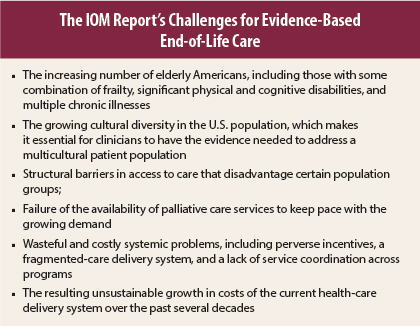Evidence-based oncology practice is a systematic approach to problem solving for cancer care providers, characterized by the use of the best evidence currently available for clinical decision-making. Over the past several decades, the oncology community, led by its major organizations such as ASCO and the National Comprehensive Cancer Network, has advanced the implementation of guidelines and other assessment tools to further integrate solid clinical evidence into daily practice, from diagnosis to treatment. However, the delivery of equitable, high-quality end-of-life care has suffered from a lack of study-based evidence.
To shed light on this important issue, The ASCO Post recently spoke with Scott D. Halpern, MD, PhD, a nationally recognized expert in evidence-based end-of-life care. He is Associate Professor of Medicine, Epidemiology, and Medical Ethics and Health Policy at the University of Pennsylvania, where he also is a practicing critical care physician. In addition, Dr. Halpern is the founding Director of the Fostering Improvement in End-of-Life Decision Science (FIELDS) program—the nation’s only research program devoted to applying principles of behavioral economics to improve treatment decisions made by seriously ill patients, their families, and clinicians.
Partners in Research
Do you believe the private and public sectors can partner in a meaningful way to improve end-of-life care?
The incentives are unusually well aligned for partnerships between academic settings and large organizations such as health systems, insurers, or other risk-bearing entities. This is true because academics are interested in conducting research that will be highly impactful, which often requires large and generalizable samples of people to study. At the same time, public and private organizations that are responsible for health care for many Americans are interested in implementing programs that are most likely to result in the highest-possible value of the health care they support.
Advance Care Planning
Please give an example(s) of initiatives or programs not backed by evidence that they improve patient outcomes.
The most recent and important example is the Centers for Medicare & Medicaid Services (CMS) decision to reimburse physicians for documenting that they have spoken to patients about advance care planning. There is no high-quality evidence that advance care planning actually improves patient outcomes and no evidence at all that modest payments to physicians will achieve these goals. However, the same dearth of evidence applies to virtually all proposed interventions, with the lone exception being outpatient palliative care consultation for patients with certain types of cancer—there is an increasingly robust evidence base that this truly benefits such patients.
The CMS has recently announced plans to reimburse physicians for time spent engaged in advance planning discussions with their patients. Some say this is based more on economics than care. What’s your opinion?
I disagree with the view that the recent CMS decision was motivated by the potential for cost savings. The current CMS leaders are incredibly committed to improving quality, first and foremost. I am highly skeptical that this particular intervention will work, but it has little downside and stems from pristine motivations.
Evaluating the Quality of Evidence
Have there been substantive studies done that have looked at and quantified what constitutes evidence-based end-of-life care?
One can evaluate the quality of evidence for end-of-life interventions in the same ways as for any other interventions, using systematic reviews, “grade” assessments, and other metrics. However, few of them have been performed in the end-of-life space. Of the ones that have, one showed there is as yet no evidence supporting physician orders for life-sustaining treatment documents, and another demonstrated there is reasonably high-quality evidence supporting outpatient palliative care consultation for patients with certain cancers.
Moving Forward
Has the Affordable Care Act (ACA) helped demonstrate the need for evidence-based end-of-life care?
I am not aware of any provisions in the ACA that specifically call for evidence-based end-of-life care. However, there are many domains of medical care that are not specifically called out by the ACA. Hopefully, the more general provisions for sustainable health insurance will facilitate and support a future health-care system that more actively seeks to develop, test, and implement evidence-based approaches to all kinds of care. ■
Disclosure: Dr. Halpern reported no potential conflicts of interest.



